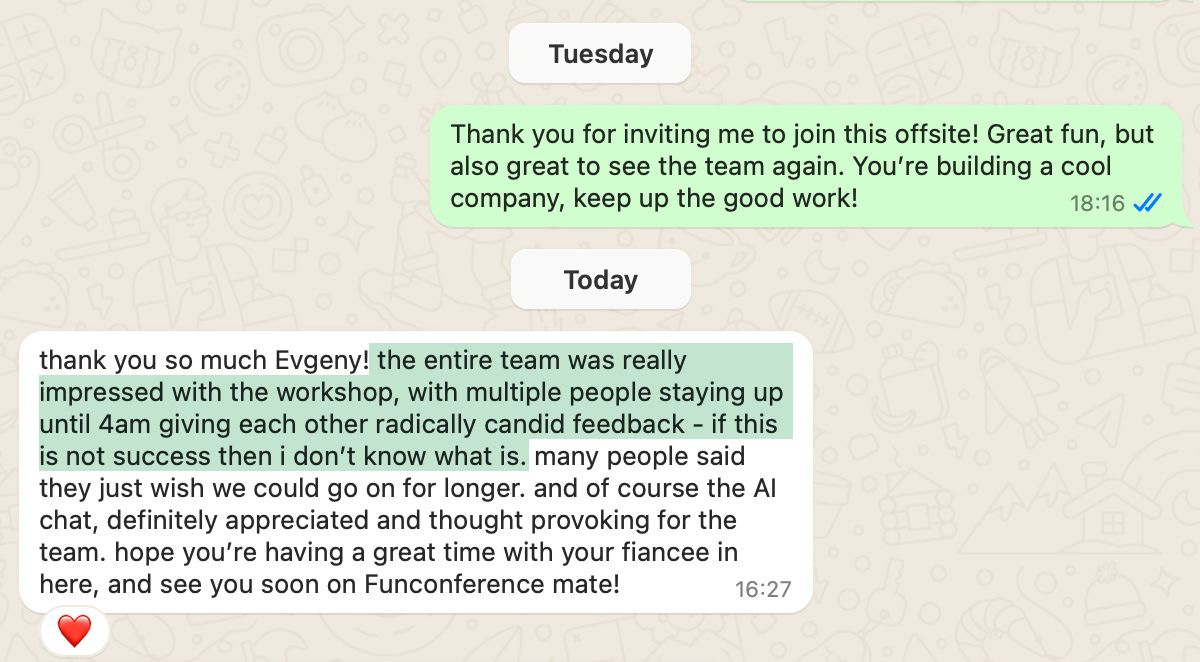Am I in an AI cult? You tell me.
The thing about cults is that they don’t look like cults from the inside, only from the outside. From the inside, they look like an oasis of normality in the world of madness.
I feel like I live in between two worlds. In one world, my friends — entrepreneurs, technologists, investors — are expecting a massive shift in the coming years thanks to AI. They read things like AI-2027, with the only question being what details that forecast gets wrong, not the direction of travel.
I’m one of them. I certainly think things will be sufficiently different, starting with jobs being more risky than self-employment.
But in another world, things go on as normal. People are applying for 25-year mortgages, companies are making 10-year plans and teenagers are choosing which degree to go for.
That is what it must feel like to be in a cult: believing you’re in a minority of people that understand something important that the rest of the world doesn’t get. Am I in an AI cult?
Speaking to people who aren’t thinking about AI as a dark thin line on the horizon a minute before tsunami strikes like I do, I think of this line from Albert Camus’ The Plague, describing the mood in the town at the very beginning of the disaster:
Our townsfolk were not more to blame than others; they forgot to be modest, that was all, and thought that everything still was possible for them; which presupposed that pestilences were impossible. They went on doing business, arranged for journeys, and formed views. How should they have given a thought to anything like plague, which rules out any future, cancels journeys, silences the exchange of views. They fancied themselves free, and no one will ever be free so long as there are pestilences.
But a plague is at least easy for us to imagine — lots of people suffer greatly and die — especially after covid. However, I realised that I really struggle to imagine the future. So when people from “non-AI world” ask me about what makes me so preoccupied with AI, I can’t give a precise enough answer.
Our entire society is built for the world without powerful technologies that we can’t control or regulate, generative AI being the biggest one of them. There is no credible scenario I know of that explains how our existing institutions that keep the society running — United Nations, governments, political systems, banks, regulators, pension funds, armies, supply chains, health systems, etc — adapt to the impact of the coming wave without some significant disruption.
What happens when the governments realise they don’t have a reason to invest in people if human labour isn’t driving value creation anymore? The Guardian asks a very reasonable question1:
Why bother investing in education and healthcare when human capital provides worse returns?
Once AI can replace everything that citizens do, there won’t be much pressure for governments to take care of their populations.
Plus, AI progress isn’t the only thing we’re living through. The existing geopolitical order is collapsing with the US, Russia and China trying to rebuild it in a new way. (Some wonder if we’re already living through WW3.) The climate will continue changing with everything that entails. The Western society is being torn apart by inequality and culture wars. All these forces will influence each other in impossible to predict ways.
Although I can’t predict what the future will look like, I expect significant change across multiple dimensions. My approach isn’t to try to predict the future and then prepare for it. I think the coming change is beyond my or anyone’s ability to forecast it.
I find it helpful to remember that the future has always been fundamentally uncertain, both on a societal and on an individual level. The world order looks stable until it isn’t, as Soviet citizens discovered one day. As individuals, we never know if we’ll live to see another day or whether we’ll stay healthy as we hope to be. In a way, this is a reminder that we need to face the fundamental uncertainty of existence that has always been with us.
I also find it helpful to reflect that to be okay, we don’t need much more than food, shelter and companionship. Yes, we have many wants, but our real needs are very simple.
Plus, the simpler our needs and our lifestyle, the happier we tend to be. We get in trouble when we imagine that we need a complex and hard to uphold lifestyle to be okay, and then work non-stop to make it possible. What it means for each of us is very different, of course.
But I also remember that great change creates great opportunities. Just like there are plenty of reasons to be worried, there are plenty of reasons to be optimistic, both at an individual and at a societal level.
Maybe this is what feels so unusual about this moment in history: an incredible mix of reasons to be optimistic and pessimistic. There were plenty of catastrophic events in history that offered few reasons be hopeful. There were genuine breakthroughs that offered a glimpse of a brighter future.
Our generation, however, seems destined to live through both at the same time.
Whether I’m part of an AI cult that needs to get away from the computer and touch grass, the future will tell. So far, I’m staying with the cult.
Radical Candour Workshop
Last week I ran a workshop on Radical Candour for Oculo, an AI-first company that’s truly changing how construction is done using AI. Later, Tom, the CEO, sent me this text:
Midway through the workshop Tom and I asked for real feedback from the participants and we modelled receiving it.
Looking back, this live exercise was probably the turning point of the entire workshop, demonstrating that offering or receiving good feedback doesn't need to be scary or aggressive. In fact, good feedback is neither scary nor aggressive. It's genuinely helpful (if not always easy to hear).
And if you can give radically candid feedback to your CEO and he actually hears you, then you find out you want to have feedback conversations until 4am.
If you’d like me to run a similar workshop on Radical Candour communication for your team, drop me a line. It was great fun doing it for Oculo!
That’s for another essay, but I wonder what’s the connection between the fact that human labour isn’t driving value creation and soft eugenics in the US.





If it's any consolation, there are lots of Substackers who are also cult members, including me.
This made me think!